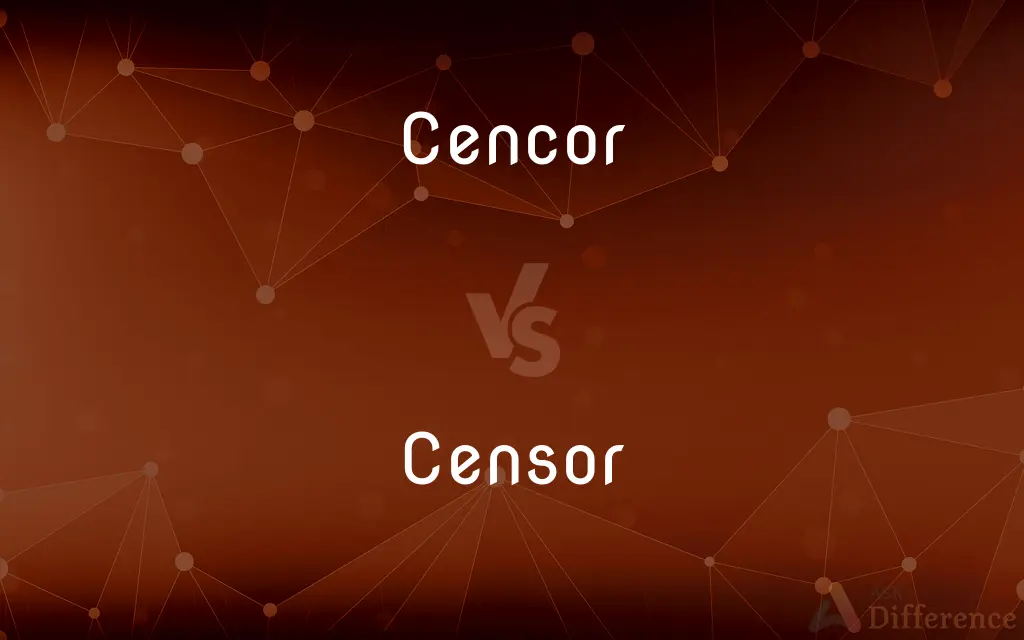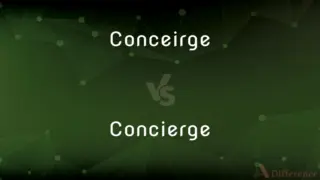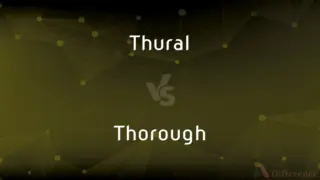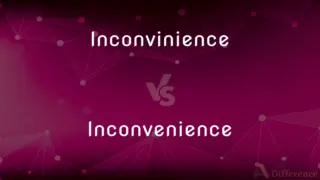Cencor vs. Censor — Which is Correct Spelling?
Edited by Tayyaba Rehman — By Fiza Rafique — Updated on April 1, 2024
"Cencor" is an incorrect spelling. The right form is "censor," meaning an individual or entity reviewing and suppressing unacceptable parts of content.

Table of Contents
Which is correct: Cencor or Censor
How to spell Censor?

Cencor
Incorrect Spelling

Censor
Correct Spelling
ADVERTISEMENT
Key Differences
Focus on the second 's' in "censor" which is absent in the incorrect spelling.
Associate "censor" with the action of "sensing" what's right or wrong in content.
Visualize a "censor" marking out words to remember the correct spelling.
Think of the "censorship," which uses "censor" as its root.
Remember "censor" sounds like "sensor," but with a "c."
ADVERTISEMENT
How Do You Spell Censor Correctly?
Incorrect: She was hired to cencor content for the television network.
Correct: She was hired to censor content for the television network.
Incorrect: The government decided to cencor certain websites.
Correct: The government decided to censor certain websites.
Censor Definitions
To examine and remove objectionable content.
The government censors certain websites for national security.
An official who examines content for suitability.
The movie's violent scenes were cut by the censor.
A critic or evaluator.
She acted as a censor for the school's magazine.
A suppressor of free expression.
Critics argue that the new law is a tool for censors.
A person authorized to examine books, films, or other material and to remove or suppress what is considered morally, politically, or otherwise objectionable.
An official, as in the armed forces, who examines personal mail and official dispatches to remove information considered secret or a risk to security.
One that condemns or censures.
One of two officials in ancient Rome responsible for taking the public census and supervising public behavior and morals.
(Psychology) The component of the unconscious that is posited by psychoanalytic theory to be responsible for preventing certain thoughts or feelings from reaching the conscious mind.
To examine and expurgate.
One of the two magistrates who originally administered the census of citizens, and by Classical times (between the 8th century {{B.C.E.}} and the 6th century {{C.E.}}) was a high judge of public behaviour and morality.
The Ancient Roman censors were part of the cursus honorum, a series of public offices held during a political career, like consuls and praetors.
A high-ranking official who was responsible for the supervision of subordinate government officials.
An official responsible for the removal or suppression of objectionable material (for example, if obscene or likely to incite violence) or sensitive content in books, films, correspondence, and other media.
The headmaster was an even stricter censor of his boarding pupils’ correspondence than the enemy censors had been of his own when the country was occupied.
(education) A college or university official whose duties vary depending on the institution.
(obsolete) One who censures or condemns.
(psychology) A hypothetical subconscious agency which filters unacceptable thought before it reaches the conscious mind.
(transitive) To review for, and if necessary to remove or suppress, content from books, films, correspondence, and other media which is regarded as objectionable (for example, obscene, likely to incite violence, or sensitive).
The people responsible for censoring films have seen some startling things in their time.
Occupying powers typically censor anything reeking of resistance
One of two magistrates of Rome who took a register of the number and property of citizens, and who also exercised the office of inspector of morals and conduct.
One who is empowered to examine manuscripts before they are committed to the press, and to forbid their publication if they contain anything obnoxious; - an official in some European countries.
One given to fault-finding; a censurer.
Nor can the most circumspect attention, or steady rectitude, escape blame from censors who have no inclination to approve.
A critic; a reviewer.
Received with caution by the censors of the press.
A person who is authorized to read publications or correspondence or to watch theatrical performances and suppress in whole or in part anything considered obscene or politically unacceptable
Forbid the public distribution of ( a movie or a newspaper)
Subject to political, religious, or moral censorship;
This magazine is censored by the government
An entity responsible for maintaining public morals.
Ancient Rome had censors who maintained the census and public morality.
Censor Meaning in a Sentence
The censor removed all the explicit scenes from the movie.
Parents sometimes censor what their children watch online.
Online platforms use algorithms to censor harmful content.
Social media companies are often criticized for how they censor content.
The government's censor board reviews all films before release.
Censor Idioms & Phrases
Bypass the censor
To evade censorship rules and publish or broadcast without alterations.
The filmmakers tried to bypass the censor by releasing the movie online.
To fall foul of the censor
To have one's work censored due to objectionable content.
The journalist's article fell foul of the censor and was never published.
Common Curiosities
What is the root word of censor?
The Latin word "censere" meaning "to assess" is the root.
Why is it called censor?
Derived from Latin, it originally referred to magistrates in ancient Rome responsible for oversight of public morality and the census.
What is the verb form of censor?
The verb form is "to censor."
What is the pronunciation of censor?
It's pronounced as /ˈsɛn.sɔːr/.
What is the plural form of censor?
The plural form is "censors."
Which conjunction is used with censor?
Conjunctions like "and" or "but" can be used based on context.
Which article is used with censor?
Both "a" (indefinite) and "the" (definite) can be used, depending on context.
Is censor an adverb?
No, it's not an adverb.
Which vowel is used before censor?
Depending on the context, various vowels like "a" or "the" can precede "censor."
Which preposition is used with censor?
Prepositions like "by" or "of" can be used, e.g., "censored by the board."
Is censor a noun or adjective?
"Censor" is primarily a noun, but can be a verb in contexts like "to censor content."
Is censor a vowel or consonant?
"Censor" is a word containing both vowels and consonants.
Is censor a negative or positive word?
It's neutral but can be seen negatively when associated with suppression of free speech.
What is the singular form of censor?
The singular form is "censor."
What is a stressed syllable in censor?
The stress is on the first syllable: "cen-."
Which determiner is used with censor?
Determiners like "the," "this," or "each" can be used based on context.
What is the second form of censor?
"Censored."
Is censor an abstract noun?
No, it refers to a specific entity or action.
Is censor a collective noun?
No, it's not a collective noun.
How many syllables are in censor?
Two syllables.
What part of speech is censor?
It is primarily a noun and can also be a verb.
What is the opposite of censor?
To allow, approve, or release.
How is censor used in a sentence?
The government decided to censor certain parts of the documentary for security reasons.
Is censor a countable noun?
Yes, for example: "There are several censors working on the project."
Is the word censor imperative?
No, but in command form, like "Censor that paragraph!", it becomes imperative.
What is the first form of censor?
"Censor" as in "to censor."
Is the censor term a metaphor?
Not inherently, but can be used metaphorically in some contexts.
How do we divide censor into syllables?
cen-sor.
What is another term for censor?
Examiner, reviewer, or redactor.
What is the third form of censor?
"Censored."
Share Your Discovery

Previous Comparison
Calandar vs. Calendar
Next Comparison
Phillipino vs. FilipinoAuthor Spotlight
Written by
Fiza RafiqueFiza Rafique is a skilled content writer at AskDifference.com, where she meticulously refines and enhances written pieces. Drawing from her vast editorial expertise, Fiza ensures clarity, accuracy, and precision in every article. Passionate about language, she continually seeks to elevate the quality of content for readers worldwide.
Edited by
Tayyaba RehmanTayyaba Rehman is a distinguished writer, currently serving as a primary contributor to askdifference.com. As a researcher in semantics and etymology, Tayyaba's passion for the complexity of languages and their distinctions has found a perfect home on the platform. Tayyaba delves into the intricacies of language, distinguishing between commonly confused words and phrases, thereby providing clarity for readers worldwide.











































